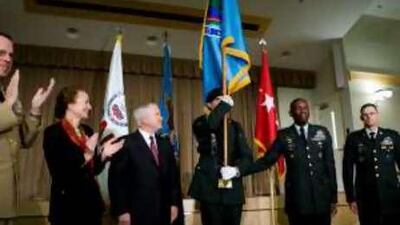JOHANNESBURG // A flag-raising ceremony on one continent this week activated a military command on a second continent thousands of kilometres away, which will cover a third continent thousands of kilometres away again.
The launch at the Pentagon, of Africom, the unified US military headquarters for Africa that will be based in Germany, was symbolic of many things - the United States' role as one of the world's superpowers, Africa's growing importance to the rest of the planet, as a source of both resources and instability, and also the continent's own ambivalence about the project. Previously, US military responsibility for Africa was split between three of its regional headquarters: Central Command (Centcom) covering the north-east of the continent, including the Horn of Africa, Egypt and Kenya; Europe Command in Germany (Eucom) covering the rest of the African mainland; and Pacific Command in Hawaii (Pacom) responsible for the Indian Ocean and island states in the area.
Now the continent has its own US military headquarters, though it is based alongside Eucom near Stuttgart, after several African countries made clear that they would not be willing to host it, despite the investment it would bring. For decades Africa was a testing ground for the Cold War, as Washington, Moscow and occasionally Beijing competed for influence and strategic footprints with little concern for the moral standing of the dictators whose allegiance they sought, or the suffering they wrought on their people.
That legacy has left long memories among the continent's elites, who now talk of "African solutions for African problems". At the same time, many ordinary Africans hold the United States in higher regard than some of their counterparts elsewhere in the world. "How can I get a visa to go to your country?" is a common refrain heard by foreigners over and over again. At the Africom launch, officials were at pains to allay the fears generated by the force, and unusually, the flags on display included that of USAID, Washington's international development agency.
"The focus is on the three Ds: defence, diplomacy and development," said Robert Gates, the defence secretary. "On the defence side, Africom's mission is not to wage war, but to prevent it; not to show United States military presence, but to enhance the security forces of our partners." The only permanent US military base in Africa is Camp Lemonier in Djibouti, home to between 1,500 and 1,800 personnel, although it has training missions with several militaries across the continent.Gen William "Kip" Ward, Africom's commander, stressed the new command's co-operative purposes and its desire to be more effective, rather than necessarily increasing the US military presence in Africa.
"Our primary mission is to work with the nations of Africa and their organisations to assist them in increasing their capacity to provide for their own security," he said. "Our programmes demonstrate what we're doing, and as that becomes more and more apparent and goes back to, well, we don't see things different, don't see invading members, bases, garrisons being stood up because it's not about that. And so, as that occurs, we do see a change and a greater receptivity."
Despite growing US reliance on west African oil - Angola and Nigeria provide vast quantities of petroleum to the United States - he said there would be no major protection operations set up in the Bight of Benin. "African nations provide for their own security," he said. "We are not doing it. Those are sovereign nations. We work with them as they seek to do things." But sceptics remain unconvinced. "Not many African countries feel comfortable about the idea of Africom being headquartered or located in their respective countries," said Festus Aboagye, of the Institute for Security Studies in the South African capital, Pretoria. "That reflects to a reasonable degree whether Africom is welcome or not. I suspect it is an idea which was conceptualised outside of Africa and then presented or sold to Africa.
"There's nothing essentially wrong with any country, and especially a country like America, defining its strategic interests, but those should not be considered as converging with those of the beneficiary region or state. "It's very clear from the available documentation that the fundamental objective of Africom is to serve as an instrument in the fight against terrorism. It serves America's strategic ends. Terrorism clearly is not one of the key defining development or stability issues in Africa."
Washington had not greatly assisted the operation of the African Union's long-planned African Standby Force, he pointed out. "Where is the kind of support that Africa needs? If our partners wish us well and wish to support us we should have seen the evidence." Mr Aboagye, a Ghanaian who heads the ISS's Training for Peace programme, said that in the past the United States had gained more from its relationship with Africa than vice versa.
"America only has permanent interests and no permanent friends. America props up dictatorships on the continent while it preaches democracy." The despotic rule of Mobutu Seso Seko in Zaire, now Congo, was a prime example from the past, but he also cited Hosni Mubarak's government in Egypt now. "These double standards degrade from the perception Africa should accord America. "I'm not sure Africom is going to make any difference," he said. "It's going to be business as usual."
@Email:sberger@thenational.ae

